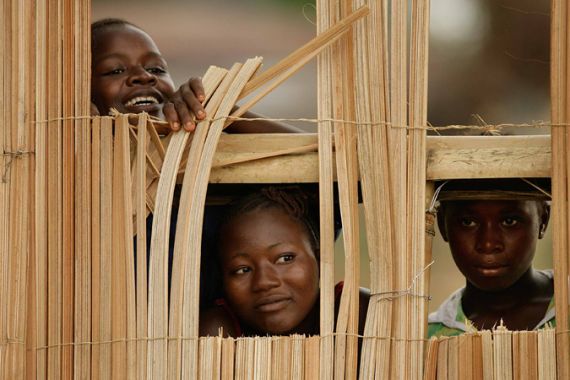
Africa belongs to Africans
When will Sierra Leoneans be able to benefit from their own natural resources, instead of being cursed by them?
By Sorious Samura
Whilst thousands of Sierra Leoneans are fleeing the country, heading to the west in pursuit of a better life, corrupt individuals and businesses see the country as a land of opportunity, a place to exploit. Sierra Leone’s natural resources, which should have been a blessing, have been nothing but a curse.
A little over a decade ago, it was diamonds that played a serious role in the eleven year long civil war which devastated Sierra Leone’s environment as rebels exploited this valuable mineral to fund their campaign. Now even in peacetime, a possible new agent of war is emerging and this time it is buried deep in the bush and it’s known to the locals as “gbenie” a unique type of wood that is secondly only to ebony.
As in most parts of Africa, timber has become the new diamonds. The country’s forests are at risk of being completely wiped out.
Experts calculate that logging is a multi-billion dollar business in Sierra Leone with Chinese companies leading the trade. Logging companies have been destroying the country’s forests, plundering natural resources and causing environmental problems but worse, it is mostly being done illegally with local Sierra Leoneans operating as the front men for the foreigners. A 2006 European Union report identified logging as “the leading cause of environmental degradation in Sierra Leone.”
Even the country’s Forestry Ministry says that unless immediate action is taken, all of the country’s forests could disappear by 2018. According to them, there is no legal, registered company in Sierra Leone with permission to cut down trees and environmentalists have warned that less than five percent of forested areas are now left in this West African country.
For these foreign investors their ultimate goal is getting their wood and making maximum profit, for the corrupt Sierra Leoneans, it is about lining their pockets without any care for the future consequences for the innocent people who will have to pay the price.
For me though, I can not help but think about those days of slavery when a few Africans used to team up with outsiders to exploit their own people and force them into slavery – today it is not our people their selling it’s our mineral resources.
When are we African’s going be free from the “resource curse”? When are we going to realise that only with the proper use of and respect of our minerals and natural resources would we be able to compete as a proud people rather than being the number one beggars of the world? Africa belongs to Africans and only Africans can save the continent. It is this kind of thinking that somehow gave birth to the series, Africa Investigates .
The aim is for African journalists to try and tell African stories in a way no outsider would, doing away with all the ‘political correctness’ that seems to be holding back western journalists from actually challenging the stereotypes and calling things by their proper names.
After an Africa Investigates Al Jazeera workshop in Ghana where we brought many fine African journalists together for this series, my team and I went back to my home country, Sierra Leone to investigate the illegal logging trade that was now wiping out the country’s forest.
Firstly, we spoke to people who were fighting against this corrupt industry, in order to find out exactly what is going on.
The president of Sierra Leone, Ernest Bai Koroma who has pledged to rid his country of corruption imposed a ban on timber export in the country but corrupt business people and their political backers soon found ways around the ban. So it was our mission to expose these corrupt ‘ways’. My team and I went deep undercover.
Posing as businessmen, we were able to meet a small-time trader who boasts of having 500 logs in the bush that are for sale for whoever is willing to pay. However, the paramount chief of the entire region whom we caught logging in the forest offered us a lot more.
He told us that a senior government minister is a close friend and that we could relay on that connection to safely do business without political interference.
I worked with a “good guy”, a quay security official, who showed me how easy it is to export containers of timber illegally at the Queen Elizabeth Quay in Freetown, Africa’s largest natural harbour. (We see this through secret filming.)
And most disturbingly of all, our undercover operation took us right into the office of one of the most senior politicians in the whole country. Sadly, his associates proved all too eager to take our money and to help us set up an illegal timber exporting business that would have contravened the official ban and added to the environmental destruction of my country.
My biggest disappointment is that our investigation revealed that there are many powerful people in government who are willing to put their personal ambitions over the needs of their nation. Unless we can put an end to this corruption now, Sierra Leone will lose its remaining forests forever, and this could lead to poverty and conflict in the future. I wonder when the ordinary people in my country will ever be able benefit from our natural resources, instead of being cursed by them.
Editor’s note: In response, the government of Sierra Leone issued the above statement promising to investigate the matters raised in this programme .
Watch more Africa Investigates for reports by undercover African journalists who face intimidation, beatings and death threats.
|
